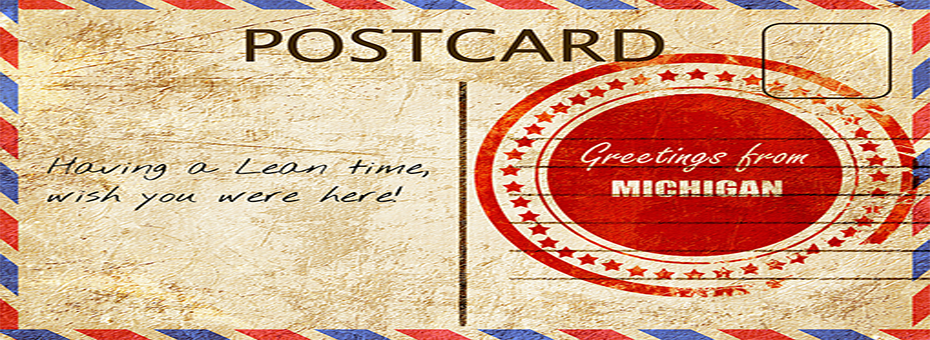It has occurred to me that all of us in the Lean Community have a perfect gift we can give and still have to give again: yokoten. Let me explain.
Recently I felt the need to check up on Ben Hartman the lean farmer. So I flew to Detroit, rented a massive Dodge Ram pick-up and drove to Goshen, Indiana. (See my column “Lean Farming”, June 28, 2016, for details on lean farming practices. Also, if you are really serious about farming, see Ben’s book The Lean Farmer.)
I found Ben in the process of moving his farm, as he had proposed on my previous visit. It will be at the exact point between Goshen and Elkhart that minimizes muda in the form of unnecessary transportation time and cost to deliver his fancy vegetables to his customers.
In his new location, he is also building a New England-style connected farm house out of recycled lumber from corn dryers on his father’s big-crop farm. This design co-locates his new home, his utility area, his processing area, and his barn in one connected structure to minimize the muda of unnecessary foot travel to accomplish his daily work. The result is a unique structure that my Maine neighbors call “big house, little house, back house, barn”. This style was invented in the 19thcentury as Mainers realized they could only compete with Western farmers with better soil if they performed additional processing of their goods – canning, bottling, and packing in sturdy shipping containers to ship to the city – and turned their homes into highly efficient mini factories. I hope it works for Ben as he competes with wasteful big-crop, mass production vegetable growers. In any case, Ben’s ingenuity continues to amaze – no one builds connected farm buildings in the big-crop, mass-production Indiana – and he will be sharing his latest thinking at the LEI Summit in Nashville in March.
From our first communication several years ago, Ben made clear to me that he didn’t pioneer his remarkable lean farm alone. He received the gift of yokoten (the spread of good ideas) from Steve Brenneman, the CEO and owner of the Aluminum Trailer Company in nearby Nappanee, Indiana. Steve was a customer for Ben’s vegetables who had already discovered lean thinking. When Ben arrived one day to deliver a CSA (Community Supported Agriculture) bag, Steve asked a simple question: “Are you a lean farmer?” And a follow-up question, “Can I visit your farm to see?” Steve had no need to do this for business reasons. But he had discovered the gift of lean thinking and felt an obligation to share. And once he saw the farm he had a lean vision of what could be done.
Steve himself came to lean thinking the more usual way. He was in a crisis and seized a way out that he had considered before but passed on. In 2008 one of his two businesses failed and had to be closed. This was a shattering blow and Steve decided he needed to take a long camping trip with his family to rethink he approach to business. He took along a copy of my and Dan Jones’ Lean Thinking, which he had bought several years earlier but put aside. He read it carefully and then listened to the audio and pondered. And by the time he got home he was ready to think about business in a new way. (Do Dan and I get some credit in the celestial accounting of lean giving? Not really. I’ll explain in a moment.)
Steve started by pursuing the common lean method of creating smoothly flowing product family value streams to eliminate large amounts of waste and to create more value for his customers by shortening lead times, reducing defects, and offering more variety to better serve customer needs. Gradually he introduced lean thinking to his suppliers and extended it throughout his organization – accounting, planning, sales. Along the way he found he needed some technical help from consultant advisors Jean Cunningham (an LEI board member) and Joe Murli (an LEI faculty member) whose work was not connected with LEI. His job every day was to he kept urging the transformation along as the hands-on leader. Today ATC has $57 million in sales, 250 employees, 3 production facilities, and a bright future.
After Steve gifted yokoten to Ben Hartman he began to talk to audiences in Northeast Indiana about the power of lean thinking. Recently he encountered Joel Daly, the General Manager of Veada Industries (a manufacturer of seating for pleasure boats) in nearby New Paris, Indiana, and has started the gifting cycle again. (Or is this re-gifting?)
Veada was struggling to grow its business without needing excessive cash and without overworking its employees in a very tight labor market where it’s hard to hire. So Steve took a look, had a vision, and got Joel started down the path. He may need a little help from consultant advisors, but Steve is providing something different and for no compensation. He is giving Joel a vision of what is possible and the courage to try new things that won’t always work the first time. (Note that the word “encouragement” has “courage” inside.) Again, Steve has no need to do this for Joel for business reasons. They work in different industries. But he remembers the gift of lean thinking and feels a continuing obligation to share.
It’s early days for Joel and I’m sure there will be bad along with good. But Steve will keep supplying vision and courage and I’m hoping Joel will soon be regifting these to someone else. This is the way, perhaps the only way, that lean thinking can grow from the scrappy but minority community we are today to become the majority approach to creating value we all desire.
In talking about gifting let me be clear that I value the work of consultants. They are the key transmitters of ideas and tools from the Lean Community. And they need to get paid. But something else is needed to go with good ideas: vision and courage. And we can all supply these essentials if we rise to the challenge. We probably won’t get paid for this, which is a good thing (and why Dan and I don’t merit much lean virtue – we sell our books as a business.) We should all because it’s the right thing.
So this year I hope you will give the gift of yokoten, something valuable that you possess but may not realize. I don’t call our movement the Lean Community for no reason. I’ve known from the beginning that spreading technical knowledge is never sufficient. We also need to spread the vision and supply the courage and to keep in touch with each other as we do. I hope you’ll resolve to join in this effort all the way through the New Year.
One final word on Goshen, Indiana: As Eric and I drove into town we noted the many houses with “Immigrants Welcome!” signs in their front yards. Good grief. What was going on? During our stay we learned that Goshen and towns in the surrounding area like Nappanne and New Paris were founded by Mennonites and Amish who came to America in the 19thcentury to escape persecution in Europe. Today they take great care to continue the spirit of community that has made them successful and to share this idea with any others who arrive. The pervasive practice of sharing to sustain a community is a background that Steve, Ben and Joel benefit from. And it inspires their efforts going forward. Experiencing it has given me a new sense about the potential of the Lean Community we seek to create through the gift of yokoten.






